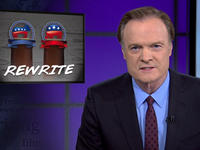On October 12, 2012, MSNBC host and former West Wing writer, Lawrence O’Donnell, dedicated his “Rewrite” commentary to the sorts of changes he believes would make presidential debates more informative, thoughtful and effective.
 Once you endure the first few minutes of a clip from the fictional West Wing, O’Donnell makes a quite compelling case that the current debate format favors superficiality over substance and is a poor predictor of a candidate’s success as President of the United States. O’Donnell is making the case that the President must be deliberate, collaborative and well-informed. The pop-quiz format of the debates reward memorization and superficiality.
Once you endure the first few minutes of a clip from the fictional West Wing, O’Donnell makes a quite compelling case that the current debate format favors superficiality over substance and is a poor predictor of a candidate’s success as President of the United States. O’Donnell is making the case that the President must be deliberate, collaborative and well-informed. The pop-quiz format of the debates reward memorization and superficiality.
In school terms, the debates measure the wrong things and focus on inauthentic tasks. This misdirects resources and distracts teachers from sound pedagogical practices.
I won’t tell you O’Donnell’s recommendations, but most if not all could be applied to matters of curriculum and assessment. You should watch for yourself!
You may be able to watch the video here or here if you’re using a dopey iPad.
Veteran educator Gary Stager, Ph.D. is the author of Twenty Things to Do with a Computer – Forward 50, co-author of Invent To Learn — Making, Tinkering, and Engineering in the Classroom, publisher at Constructing Modern Knowledge Press, and the founder of the Constructing Modern Knowledge summer institute. He led professional development in the world’s first 1:1 laptop schools thirty years ago and designed one of the oldest online graduate school programs. Gary is also the curator of The Seymour Papert archives at DailyPapert.com. Learn more about Gary here.

If they allowed the debaters to access information- they wouldn’t need some dude in a suit on the sidelines.
The administrations could create a wiki or other resource for the debaters. What if they were allowed to say- “hey- I have this great graphic that represents all of our oil reserves in the United States….” and then elaborate on the significance.
How could that change the level of debate? They’d have to cite their resources, and then the resources would be thrown into question, I’m sure. Could be a fact checker’s dream come true.
-DR